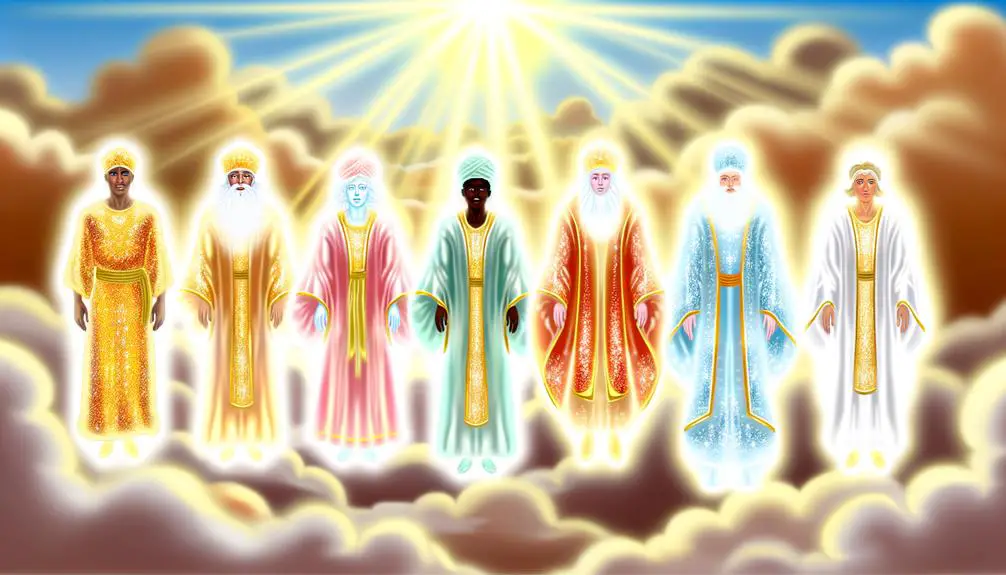Witness the divine splendor of Heaven in the Bible, where eternal peace and celestial beauty beckon the soul to explore deeper mysteries.

Description of Heaven in the Bible
In the Bible, you'll find that Heaven is depicted as God's magnificent dwelling, brimming with splendor and manifestations of divine grace. It's where streets of gold symbolize purity and the walls are made of jasper, underscoring the ethereal quality of this celestial domain. Here, angels and souls of the righteous exist in eternal harmony, cultivating a divine hierarchy that praises and worships God continuously. Elements such as the River of Life and the Tree of Life denote eternal sustenance and ongoing life, conveying deep spiritual truths and the profound serenity of God's presence. Exploring these scriptures further reveals layers of meaning in this divine abode.
Key Takeaways
- Heaven is depicted with streets of gold and walls of jasper, symbolizing divine splendor and purity.
- It features the River of Life and the Tree of Life, signifying eternal sustenance and ongoing life.
- Inhabitants include God, angels, and the souls of the righteous in a structured divine hierarchy.
- Prophetic visions in the Book of Revelation highlight its grandeur with detailed celestial imagery.
- Heaven serves as God's dwelling place, representing ultimate peace and the seat of divine governance.
Biblical Foundations of Heaven

The concept of heaven is deeply rooted in Scripture, where it's often depicted as God's dwelling place and the ultimate reward for the faithful. As you explore the scriptural origins, you'll find that heaven is not just a location but a manifestation of divine governance. The Bible positions heaven as a domain where God's authority and will are perfectly executed, distinct from the human experience of governance marked by flaws and limitations.
In the Old Covenant, heaven is depicted as the seat of God's sovereignty. Isaiah 66:1, for example, states, “Heaven is my throne, and the earth is my footstool.” This metaphor emphasizes the transcendent nature of divine rule, contrasting earthly and heavenly authority. The New Covenant further develops this concept, presenting heaven as a domain where righteousness prevails, guided by God's direct governance. Matthew 6:10 captures this in the Lord's Prayer, 'Your kingdom come, your will be done, on earth as it is in heaven.'
This all-encompassing view highlights heaven's role not only as a physical space but as a symbol of perfect governance, where divine will is seamlessly enacted, offering a blueprint for justice and morality that transcends earthly imperfections.
Heaven's Physical Descriptions
As you explore the Bible's descriptions of Heaven, you'll find that celestial landscapes and architectural elements are vividly depicted. Scriptural texts, such as the Book of Revelation, provide intricate details of a domain with streets of gold and walls of jasper, emphasizing the splendor and majesty intended by these divine images. These elements are not merely ornamental but serve to convey the theological richness and eternal perfection of Heaven, inviting deeper reflection on their symbolic meanings.
Celestial Landscapes Described
Heaven's landscapes, often portrayed in scripture, reveal a domain of astonishing beauty and divine construction, where streets of gold and gates of pearl serve as mere introductions to its glory. As you explore further, you'll encounter angelic gardens, each a manifestation of divine colors, imbued with hues that transcend earthly spectrums. These settings are not just visually stunning but also symbolically rich, reflecting a higher spiritual reality.
Feature |
Description |
|---|---|
Streets of Gold |
Symbolic of purity and the divine nature of the domain |
Gates of Pearl |
Represent accessibility and heavenly grandeur |
Angelic Gardens |
Sites of serene contemplation and celestial beauty |
Divine Colors |
Hues that surpass anything known on earth |
River of Life |
Flows with crystalline clarity, symbolizing eternal life |
This tableau isn't merely to enchant; it invites deeper contemplation of the divine.
Architectural Elements Highlighted
Exploring further, you'll discover that architectural elements in Heaven, such as immense, intricately designed structures, underscore its divine purpose and origin. These edifices, described in scriptural texts, are not merely grandiose but manifest the divine construction that speaks to a higher craftsmanship unattainable by human hands. For instance, the Book of Revelation details the New Jerusalem's walls, constructed from jasper and foundations adorned with every kind of precious stone, reflecting an ethereal quality unique to divine domains. Such descriptions are not only symbolic but also indicative of the transcendent nature of these heavenly abodes. The use of ethereal materials further emphasizes the celestial and unworldly aspect of Heaven, suggesting that its architecture serves both functional and theological purposes, guiding souls towards the divine.
Residents of the Heavenly Realm

In the biblical context, the inhabitants of the heavenly domain primarily include God, angels, and the souls of the righteous. You'll find that the hierarchy and roles within this domain are meticulously outlined in scriptures. Angels, for instance, have specific duties which are integral to the divine order. These angelic duties range from messengers of God's will to warriors in spiritual battles, each classified within a divine hierarchy. Seraphim, known for their closeness to God, continuously worship and praise Him, reflecting their pivotal role in maintaining divine order.
The souls of the righteous, meanwhile, attain their place in heaven through divine grace and judgment. These souls live in eternal communion with God, free from earthly suffering and sin. Their presence in heaven is often depicted as a reward for their faithfulness and moral integrity on Earth.
Understanding the residents of heaven requires you to grasp the complex interplay between divine justice, angelic mediation, and human righteousness. Each component is critical, functioning within a well-defined, purpose-driven celestial framework. This celestial composition not only underscores the structured nature of the heavenly domain but also highlights the profound interconnectedness between divine will and the ultimate destiny of human souls.
Symbolism and Metaphors
The symbolism and metaphors used in biblical descriptions of heaven often serve as profound tools for conveying spiritual truths and divine realities. When you explore the Scriptures, you'll find that divine imagery and spiritual allegories are not mere artistic expressions but are integral to understanding the transcendent and holy nature of heaven.
- Streets of Gold: Reflecting the incalculable value and purity of the heavenly kingdom, where material wealth holds no sway over spiritual riches.
- River of Life: Symbolizes eternal sustenance and the never-ending provision of God's grace, flowing from the throne and nourishing all who partake.
- Tree of Life: Represents ongoing life, healing, and reconciliation, accessible to all and denoting a restoration of Eden's ideal.
- Crystal Sea: Implies clarity and tranquility in God's presence, a stark contrast to the chaotic and opaque waters often used to symbolize earthly troubles.
These metaphors encourage you to see beyond the physical to the spiritual implications. They invite you to contemplate the majesty and mystery of God's ultimate promise. As you ponder, you're not just reading ancient texts but engaging with a living dialogue about the divine sphere.
Heaven in Prophetic Visions

Prophetic visions offer you a glimpse into heaven's mysteries, revealing its divine essence through vivid, symbolic narratives. These narratives, rich in metaphor and imagery, provide you with a framework to comprehend the incomprehensible: the ultimate reality of heaven. The Book of Revelation, particularly, stands as a cornerstone of such visionary interpretations. Here, the Apostle John encapsulates the culmination of divine prophecy, affording a detailed portrayal of heaven's grandeur. His descriptions—streets of gold, a crystal sea, and the Tree of Life—serve not merely as ornamental details but as profound symbols conveying theological truths.
These prophetic revelations are imbued with a clarity that pierces through the veil of the mundane to present a celestial kingdom governed by God's righteousness and justice. This prophetic clarity isn't just about predicting future events; it's about revealing the deeper realities of God's kingdom, offering you insights into the nature of divine existence and governance. Through such scriptures, you're invited to reflect on the transcendent, to understand not just the structure, but the very essence of heaven—a domain of eternal peace and divine presence, unmarred by earthly limitations.
Heaven's Influence on Believers
In Scripture, you find that the concept of Heaven greatly shapes the moral compass of believers. It's seen as not only a promise of eternal peace but also a profound motivator for righteous living among the faithful. This dual role challenges you to reflect on how the anticipation of Heaven can transform day-to-day ethical behavior and spiritual commitment.
Motivation for Righteous Living
Why should you, as a believer, consider heaven a profound motivator for living a righteous life? The concept of heaven serves not only as a final destination but also as a guiding force in your daily conduct. The promise of eternal rewards offers a compelling incentive to adhere to a moral compass that aligns with scriptural teachings.
- Eternal Perspective: Keeps your focus on the everlasting, rather than the ephemeral pleasures of the world.
- Accountability: Reminds you that choices made in this life impact your eternal standing.
- Holiness: Encourages living in purity and righteousness as a reflection of divine nature.
- Legacy: Inspires you to leave a positive, lasting impact on others through godly living.
These aspects contribute to a life that is both meaningful and directed toward eternal significance.
Promise of Eternal Peace
As believers anticipate the promise of eternal peace in heaven, they find profound comfort and motivation in their earthly journey. This divine tranquility isn't just a distant hope but a present reality that shapes your daily life. Scripture assures you of a future where spiritual fulfillment transcends all earthly troubles. Consider Revelation 21:4, where God promises to wipe away every tear, asserting a future devoid of pain and sorrow. This vision of eternal peace isn't merely about the absence of conflict; it's about the presence of God's overwhelming peace. It's this assurance that fuels your resilience and empowers you to endure trials with a perspective anchored in the everlasting. In this, your faith finds both its challenge and its greatest reward.
Frequently Asked Questions
How Do Different Denominations Interpret Heaven?
Different denominations paint heaven with wildly diverse theological brushes, each interpreting Scripture through their lens. You'll find variations rooted in deep theological differences and nuanced scriptural interpretations, shaping their celestial visions profoundly.
Can People Communicate With Those in Heaven?
You'll find that spiritual boundaries and afterlife ethics generally discourage direct communication with those in heaven, reflecting a complex interplay of doctrinal interpretations and scriptural teachings across various religious traditions.
Does Everyone See Heaven in the Same Way?
Heavenly visions vary; juxtaposing cultural perceptions reveals distinct interpretations. You'll find that scriptural analysis suggests these differences are substantial, highlighting how personal and cultural backgrounds shape each individual's unique view of heaven.
Are There Different Levels or Areas in Heaven?
You might find that interpretations suggest a heavenly hierarchy and spatial distinctions within heaven, reflecting varying degrees of closeness to the divine presence, as seen in scriptural texts analyzing celestial structures.
How Has the Concept of Heaven Evolved Over Time?
Heaven's concept has evolved greatly, influenced by historical events and cultural perceptions. You'll find its depiction shifts from ethereal domains in early texts to more personalized interpretations in modern theological discussions.



Sign up